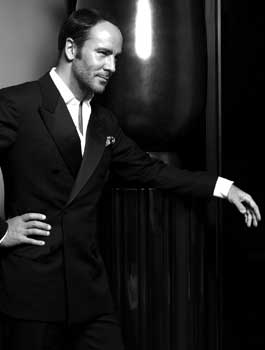
I had the chance to listen to Tom Ford, and to meet him, at a CEO Summit for WWD | Beauty | Miami. Nice man. Incredibly articulate thinker, as well. And this was, formally, before the announcement of the Tom Ford brand. Shirin Von Wulffen, a person I worked with at Yves Saint Laurent went on to become his directrix of global public relations. I’ve stayed in touch with her — and she generously gave me a tour of the new store on Madison Avenue. And, as well, some added insights into Tom Ford, the presence.
I’ve written about that:
http://blog.girvin.com/?p=343
I followed some of his observations in Moscow at an event there, with a group of other luxury luminaries. The International Herald Tribune | Supreme Luxury.
The point, to Susie Menkes leadership of the event is about relevance. How do we stay relevant would be a question for anyone in the creative space. How do you create things that are offered that make sense to your market. Good query, I’ve proffered for myself and the work that I do.
And Tom is faced with the same grouping of challenges that any leader of a new internationally positioned brand is affected by. But fashion is more so the sliding whim of, literally, what’s fashionable. And Ford’s leadership and gut instinct about what the new wave might be is intuitively powerful. He’s won far more than he’s lost.
He believes in the certainty of uncertainty. That is “the future of our industry is sure; however, how the future will unfold is unsure.” Change is, surely, immanent.
But another reflection is the very word: luxury.
Let me certify, then:
luxury
1340, “lasciviousness, sinful self-indulgence,” from O.Fr. luxurie, from L. luxuria “excess, luxury,” from luxus “excess, extravagance, magnificence,” probably a fig. use of luxus (adj.) “dislocated,” which is related to luctari “wrestle, strain.” Lost its pejorative taint 17c. Meaning “habit of indulgence in what is choice or costly” is from 1633; that of “sumptuous surroundings” is from 1704; that of “something enjoyable or comfortable beyond life’s necessities” is from 1780. First used as an adjective 1930.
luxurious
c.1330, “lascivious, lecherous, unchaste,” from O.Fr. luxurius (Fr. luxurieux), from L. luxuriosus, from luxuria (see luxury). Meaning “given to luxury, voluptuous” (of persons) is from 1606. Of things, meaning “characterized by luxury” is attested from 1650.
luxuriate
1621, “to indulge in luxury,” from L. luxuriatum, pp. of luxuriare “indulge, have to excess,” from luxuria “excess”
There are some fairly negative connotations here, looking back through the folded time of etymology. And what I offer is that the history of words can be telling — they tell a story.
And there’s an interesting learning, to the sequencing — which, from 300-700 years ago focused on excessive, even lascivious, indulgence — to something that lies beyond life’s necessities. And I suppose the logical inference is that luxury, really, is unnecessary. But, there’s a contrary point and that is that luxury is something that is above and beyond — the norm. And therefore must be paid for, that which is above and beyond. Obvious. If there’s a suit in Tom Ford’s shop that costs, at base, $5,000.00 and up, then, to his offering, it will be a thing exceptionally well made. The result of many hours of design thinking, delicacy of preparation, exquisite character in execution and fabulously woven fabrics. Truth, be told. And the customers that reach for his offerings will know the character of the work — and the worth of the payment. Not that I own, personally, anything near that degree of extravagance. But I admire the work.
That’s where luxury lives.
But the word, itself, is falling apart.
To Tom’s query —
What is luxury:
studio apartments
coffee
frozen luxury fried chicken?
How does that apply?
There needs to be a re-thinking of what luxury stands for, or how it’s described — or, as Tom puts it, the word, if not the world, of luxury will be simply out of date, referencing his early reflections on trend and their advancements. New senses of what is luxury will need to be considered. And I believe that they are emerging. The New Luxury might be a way to consider it.
To questioning — “How can we ensure luxury doesn’t go out of fashion?” Tom Ford commented, “Prior to the ’90s, luxury was outside the trends,” but in less than 30 years, it has gone “from hard to find to hard to miss” in what he says has “diluted the authority of luxury brands.” I take the call to the notion of authority. And what that means — as a sense of the preeminence in authoring. That means that luxury truly, has to be the best, the most distinguished. And with dilution, it won’t be.
Acknowledging the IHT event name, Ford said, “Supreme Luxury has to have longevity”, it’s about, literally, having the “free time to enjoy life”. Adding to the discussion — “any product that frees up time with as little effort as possible” will be luxurious. Another reflection is what he describes is credibility. Products with deep expertise — and the return of the artisanal.
What, to communications then? Credibility is surely the foundation; there needs to be a betterment of clarity, editing, sharpening — and focus — in a market that is increasingly overcrowded. And overpowered. The point, now, will be about creating differentiation in a manner that is discrete from hype.
What, culled from this:
The new luxury will be:
relevance
credibility
authoritative
artisanal | hand made
deep expertise
focused
truthful (as discrete from hype)
worth
Truth be told.
tsg | nyc